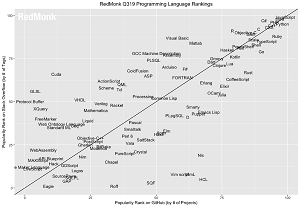News
TypeScript Cracks Top 10 in Programming Language Popularity Ranking
Just a couple months after declaring TypeScript was "exploding" in relation to other programming languages, analyst firm RedMonk is out with a new ranking that shows it cracking the top 10, a rare event in the history of the index.
Microsoft created the open source TypeScript language in 2012 and it has climbed steadily in popularity thanks to its unique scheme of providing optional static typing for JavaScript-based coding, among other features.
"With the exception of one quarter in 2018 in which Swift placed tenth, it has been five years since we saw the entrant of a new top ten language," said RedMonk's Stephen O'Grady in announcing the June 2019 ranking. "In this quarter's run, however, TypeScript continued its upwards surge by placing tenth."
TypeScript's entry into the top 10 came at the expense of Apple's Swift, which RedMonk had previously described as the fastest-growing language in the history of its ranking, and Objective-C, also traditionally used by Apple-centric coders.
 [Click on image for larger view.] The Third Quarter Plot for 2019 (source: RedMonk).
[Click on image for larger view.] The Third Quarter Plot for 2019 (source: RedMonk).
TypeScript jumped up two spots from the previous ranking, prompting RedMonk to observe:
Three years ago at this time, TypeScript had just broken through to #26 after languishing in the thirties for years. This quarter, as mentioned above, the JavaScript superset capped off one of the more remarkable growth stories we have ever seen in these rankings, placing in the top ten for the first time after surging to #12 last quarter. In doing so, it passed both Objective-C and another fast riser on these rankings, Swift. Ironically, those two languages competition with one another is likely what enabled TypeScript to pass them both, but it is no fluke. The ubiquity of JavaScript coupled with the optional safety offered by TypeScript has proven to be a winning combination, and vaulted it directly into rare territory. It will be interesting to see if it can sustain this rank, or if like Swift before it, this is a temporary gain. Either way, TypeScript is a language that many are betting on moving forward.
While a few other languages went up and down slightly, the top 20 constitutes a cast of familiar characters:
- JavaScript
- Java
- Python
- PHP
- C++
- C#
- CSS
- Ruby
- C
- TypeScript
- Swift
- Objective-C
- Scala
- Shell
- R
- Go
- PowerShell
- Perl
- Haskell
- Kotlin
RedMonk uses a formula based on GitHub and Stack Overflow to compute its ranking, with the methodology detailed in the aforementioned post.
About the Author
David Ramel is an editor and writer at Converge 360.